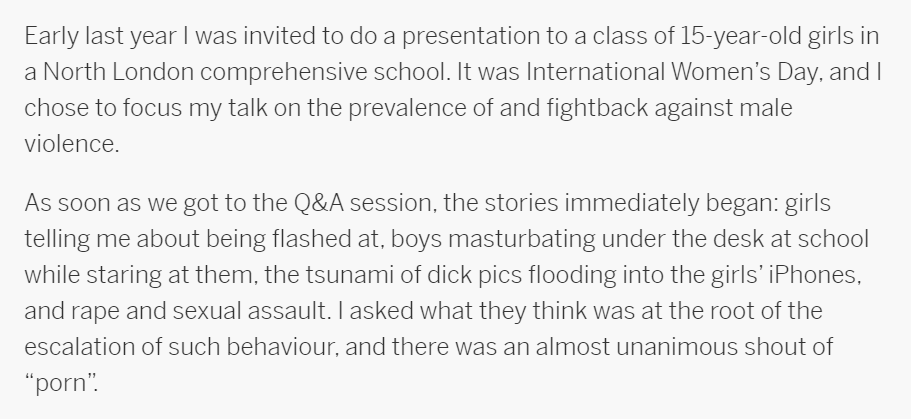
🧵The more I read about sexual harassment and 'rape culture' the more it shocks me that so little of it is being attributed to pornography, and so little is being done to curb porn sites and prevent access to porn by impressionable children and young people.
This week, a report by schools' regulator Ofsted found that sexual harassment is 'normalised' among school-age children. 9 in 10 girls interviewed by inspectors reported sexist name-calling and being sent unwanted explicit images "a lot" or "sometimes". bbc.co.uk/news/education…
There were reports of unwanted touching in corridors and of sexual attacks at parties and other social events. The report found that reporting is not encouraged properly, so the real scale of the problem is not known about by school staff.
Only a few voices attribute this awful culture to porn. But how can it not be the cause? Young people consume porn. Porn normalises and fetishises sexual violence. You don't need a degree in psychology to understand what's going on. fightthenewdrug.org/get-the-facts/
The best article I've come across in response to Ofsted's findings is by feminist Julie Bindel. As they say in Scotland, she 'kens the script'. unherd.com/thepost/sexual…
Bindel recounts her own experience of talking to girls at a London school. Children themselves see porn as the main problem. 

Consider also this quote by Gail Dines - in 2010.
"We are now bringing up a generation of boys on cruel, violent porn, and given what we know about how images affect people, this is going to have a profound influence on their sexuality, behaviour and attitudes towards women."
"We are now bringing up a generation of boys on cruel, violent porn, and given what we know about how images affect people, this is going to have a profound influence on their sexuality, behaviour and attitudes towards women."
Dines and others saw years ago what the results of access to porn would mean for our society. Yet legislators have largely ignored calls for porn sites to be curbed, and children protected.
Govt inaction on porn is woeful. Legislation (Part 3 of the Digital Economy Act) has been on the statute book since 2017. If it was implemented, porn sites would be required to verify the age of users, preventing access to children. But it has not been. care.org.uk/news/2021/06/s…
The DEA would also provide for a regulator of extreme content, with powers to act and punish sites that host vile videos. This would go some way towards getting rid of the worst content accessible to young people. Again, this policy sits redundant on the shelf.
The UK Govt has no valid argument against implementing these safeguards which have already been approved by parliament, with support from children's charities, women's groups and campaigners. Dozens of parliamentarians are calling for Ministers to act. care.org.uk/news/2021/05/p…
MSPs are also urging the government to do the right thing. Holyrood can't make this decision - it is depending on the UK Gov to act in order to protect Scottish children and young people. pressandjournal.co.uk/fp/opinion/321…
It is shameful that these provisions have not been implemented. The government is working on an online safety regime at present. This could help matters but it won't be ready for years. And it dosn't include age checks. Why can't we implement safeguards that are ready now?
More widely, we need to have a conversation about porn. Do we really want to allow an exploitative industry to continue to propagate degrading ideas about women and warp the minds of young people without consequence?
It is time to get serious about curbing porn. Action couldn't come sooner for children and women.
@threadreaderapp unroll
• • •
Missing some Tweet in this thread? You can try to
force a refresh



